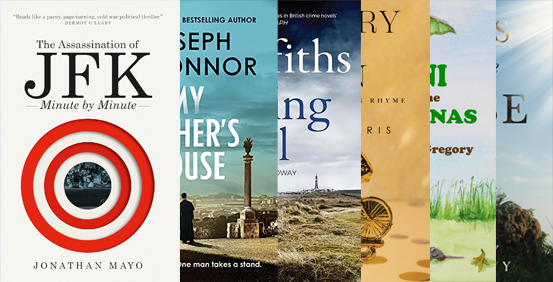
My Father’s House by Joseph O’Connor – Review by John Davis
Rome’s Vatican City is the smallest independent state in the world with an area of about 120 acres (50 hectares) and a resident population of some 800.
This status remained sacrosanct even during the period when the Nazis occupied Rome in the early 1940s and it is this environment that provides the background for Joseph O’Connor’s story.
Said to be loosely based on the exploits of the Irish priest Father Hugh O’Flaherty, the novel outlines his involvement in the financing and running of an escape line for Allied prisoners of war and Jews on the run from the occupiers.
The priest is well aware of what conditions are like outside the Vatican for these people and indeed the citizens of Rome for part of his role at the Vatican is to visit camps to monitor the condition of internees.
Throughout, the clergyman is helped by a disparate collection of characters known collectively as ‘The Choir’ who purport to be enthusiastic singers meeting in an old hospice attached to St. Peter’s Basilica to rehearse for a concert. These include an Irish singer married to a diplomat, one of Rome’s newsagents, a freelance journalist, a British Army major and an Italian Contessa.
The villain of the piece, and surely there has to be one, is Gestapo officer Paul Hauptmann, who knows exactly what is going on but seems unable to staunch the flow of prisoners making good their escape.
The concluding chapters, on Christmas Eve, 1943, are especially gripping as the rendimento (performance) finally takes place-a series of money drops around the deserted streets of the Eternal City to help finance the whole clandestine operation.
Footnote: Older readers may draw parallels with the 1983 made for television film The Scarlet and the Black starring Gregory Peck and Christopher Plummer.
Published by Harvill Secker
Dying Fall by Elly Griffiths – Review by John Davis
Whenever I go into a large bookshop these days and look at all the mystery/detective novels there are to choose from, I often wonder how on earth authors manage to make them different.
Some go for distinctive male/female leads, others for specific geographical locations and yet more for current criminal events or historical cold cases. It must be increasingly difficult to find a niche in this ever-burgeoning market these days especially when every other well-known celebrity seems to be penning them as well.
Elly Griffiths’ heroine of choice here is forensic archaeologist Doctor Ruth Galloway who has to date picked her way through a whole series of criminal dilemmas. This apparently is the fifth in line.
Briefly the plot revolves around Ruth’s friend, fellow archaeologist Dan Golding, who makes a startling discovery that could alter our opinion about a cult figure from history. Problem is, before Golding can divulge the information to Ruth, he is found dead following an intense fire in a house which has the front door firmly locked from the outside.
Throw in references to Arthurian legend, the Witches of Pendle, the symbolism of ravens and a sinister Neo-Nazi organisation (The White Hand) and you have quite a heady mix.
Solving the crime is a bit like peeling the layers of an onion, it looks pretty unobtrusive on the outside but there is an awful lot going on in the tightly packed layers beneath.
Some readers claim they spotted the ringleader soon after the start but I’m sceptical, so watch out for the bluff, or is it a double bluff before you get to the end.
Published by Quercus Books
The Assassination of JFK: Minute by Minute by Jonathan Mayo – Review by John Davis
Along with the death of Elvis Presley and Neil Armstrong stepping onto the moon, the assassination of President Kennedy in November 1963 is certainly up there when it comes to ‘where were you at the time’ moments.
Despite numerous research articles, witness testimonies, film footage, documentaries and enquiries, official and unofficial, speculation still swirls around the event and conspiracy theories abound.
The purpose of Mayo’s approach, first used on radio, is to break the scenario down into tiny ‘factual’ bitesize pieces. While we are all aware of the broad brushstrokes of the happening, he aims to provide the ‘small pen-point’ details.
From 9.00 p.m. on Thursday November 21st until 11.55 p.m. on Monday November 25th, we are there on the frontline as a diverse group of people, from the powerful to the lowly, become caught up in the fast-moving events.
There is Secret Service agent Clint Hill distraught at a job badly done, construction worker Howard Brennan on his lunchbreak, reporter Hugh Aynesworth scribbling his notes on the back of an electricity bill using a borrowed pencil and Robert Kennedy sitting in a truck waiting for his brother’s body to arrive. There is even a brief appearance from the late DJ John Peel, who allegedly got into the Dallas Police Department when Oswald was charged, posing as a reporter from the Liverpool Echo.
The book is an example of how a huge historical moment can be broken down into a myriad of often mundane individual events. The end result is that the narrative comes out like a pacey thriller. We know what the end will be but somehow the desire to get there pulls us along.
For readers who like this approach there are identical ‘minute by minute’ books to cover the sinking of the Titanic, the D-Day invasion and Hitler’s last days in the Berlin Bunker.
Published by Harvill Secker
Tales from the Tribe By Lesley Docksey
Agriculture and its subsequent damage started 11,000 years ago in the Mesolithic Age, says author of Tales from the Tribe Lesley Docksey. In the Neolithic Age men saw themselves as owners of the land. They felled our woods for more grazing land. They traded in flint, salt, cattle and grain. ‘As the population grew, their greed for power and control began pushing us towards a ruined world and climate change.’
Visiting Neolithic sites while worrying about climate change brought the two subjects together. Something felt wrong. What had really happened so long ago? Surely some of those people were uncomfortable over what was changing their world? ‘Slowly, in my mind, the characters in these stories made themselves known. All I had to do was to write their stories, their fear, their pain, their fleeing from the damage and coming together and fighting back.’
‘All you have to do is read their stories—and take action.’
Always interested in prehistory, nature and wildlife Lesley Docksey delivers a decisive collection of short stories about greed, environmental destruction and danger.. She studied art then worked in London, making historic costumes for TV, films and stage and travelled a lot.
After becoming freelance she returned to the countryside where working from home meant a good career plus a rural life: animals, walking, and riding horses while surrounded by prehistoric ruins and legends. Still working, she became involved in climate change and peace activism and edited a peace newsletter, wrote articles for web sites and The Ecologist and fought against badger culling. For her own pleasure, she wrote stories, poems and wondered how Neolithic people lived.
Published by Pegasus Publishers
Poetry for Fun By Robb Harris
Step into the enchanting world of poetry with Poetry for Fun by Robb Harris. This captivating collection of poems will transport you to a realm of laughter, introspection, and pure delight.
With his masterful use of words, Harris takes readers on a journey through the full spectrum of human emotions. From whimsical verses that tickle the funny bone to heartfelt lines that resonate deeply, Poetry for Fun showcases Harris’ creative genius and his ability to capture the essence of life in every stanza. Prepare to be enchanted as Robb Harris weaves magic with his words, leaving you inspired, moved, and eager for more. Dive into Poetry for Fun and let the beauty of Harris’ poetry ignite your imagination.
Robb Harris’ professional life up to this point has been as a financial advisor, which means spending time discussing the seriousness of finance, death and illness, so he has always maintained a slightly juvenile sense of humour to feel happy in life.
After moving to Dorset with his wife, Nicky, he has been inspired to put pen to paper and he loves the process of recording his thoughts in a format that hopefully will entertain.
Published by Olympia Publishers
Beni and the Bananas By Cynthia Gregory
The young orangutan Beni’s favourite rainforest food is bananas. He doesn’t care about his Mum’s advice not to eat too many. He sneaks off, determined to find his treat. But getting what he wants isn’t as easy as he’d imagined. His search gets him into all sorts of trouble.
Written and illustrated by Ottery St Mary resident Cynthia Gregory, Beni and the Bananas was conceived after the author had been watching The Orangutan Jungle School on television. It is a programme for the ecological charity, Borneo Orangutan Survival Foundation (BOSF), which tries to rehabilitate this endangered species back into the wild. It told of the horrific killing of orangutan mothers by islanders, to sell their babies as pets.
BOSF tries to save as many orphans as possible. They aim to teach them the skills their mothers would have imparted, and eventually allow them back into the wild.
Always an avid reader, after a career in teaching, a spell living in France where she wrote cookbooks, and a novel A Little Slice of Paradise, Cynthia Gregory was moved to write a children’s book to support BOSF.
She took online courses about writing for children. Spent hours writing, rewriting and editing as well as learning about orangutan habits. Practiced how to draw them and spent days studying children’s books. Week after week, she painted watercolour illustrations whilst exploring book marketing and then eventually self published Beni and the Bananas which is now available on Amazon. Cynthia has since been able to make several donations of the profits to the charity.
Independently published



